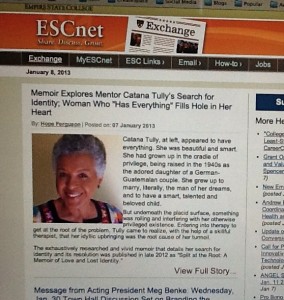
By: Hope Ferguson | Posted on: 07 January 2013
Catana Tully, at left, appeared to have everything. She was beautiful and smart. She had grown up in the cradle of privilege, being raised in the 1940s as the adored daughter of a German-Guatemalan couple. She grew up to marry, literally, the man of her dreams, and to have a smart, talented and beloved child.
But underneath the placid surface, something was roiling and interfering with her otherwise privileged existence. Entering into therapy to get at the root of the problem, Tully came to realize, with the help of a skillful therapist, that her idyllic upbringing was the root cause of her turmoil.
The exhaustively researched and vivid memoir that details her search for identity and its resolution was published in late 2012 as “Split at the Root: A Memoir of Love and Lost Identity.”
Tully had been born to a black unwed mother, who had apparently willingly handed her over to a genteel, strong-willed, and slightly eccentric middle-aged German woman and her second husband. They doted on their “little Mohrle,” which could either mean little Moor or little darkie. She was given the best education, beautiful clothes and expensive gifts. She spoke German, Spanish and English fluently. As an adult, she set off for language studies in Germany, and ended up pursuing a successful career as an actress then model. At 27, she met Fred Tully, an American actor, who bore an uncanny resemblance to a man she had literally “seen” in childhood dreams. They went on to become the proud parents of a son, Patrick, and move to the U.S.
But as middle-age began, Tully found herself struggling. Thus began a quest to get to the root of the problem, which she came to believe was the “primal wound” she suffered when separated from her black mother, whom she had shunned when alive.
“I had the most privileged life, but I was always insecure,” says Tully. “When I came to the [United] States and had to interact with blacks, all of the sudden, all of that [sense of privilege] was gone. It was as if my magic carpet became a rug that was pulled out from under my feet.
“I had a conflict with being black – I didn’t look at myself in the mirror,” she says.
The book sets off on the same trajectory as other memoirs by black children raised by white families who have had to come to terms with imperfect parents and pasts, such as President Obama’s “Dreams from My Father” and Mark Whitaker’s “My Long Trip Home.” However, both of those books dealt with a son searching for his black father. In Tully’s book it is her black mother, Rosa, who left a hole in her heart.
Although she was aware early on of who her parents were and that they had been unwed, Tully began to hear whispers about why she was raised by the Germans. Was she voluntarily given up by a poor unmarried mother, or more ominously, was she snatched, or stolen, by the beloved parents she called Mutti and Vati? And was the handsome, debonair biracial man Mutti had identified as her biological father really her father, or did Mutti have ulterior motives for telling her so? Those mysteries are at the heart of the memoir, which explores how Tully was able, finally, to affirm her identity and forgive others – and herself.
In an interview, Tully explains that it took her 15 years to write the memoir. When she fully retired in 2011 she picked it up again, and took the advice of a friend to tell her story chronologically. She believes that the story is even more necessary today with so many more “mixed” families being formed through marriage or adoption.
The response to the book has been “amazing,” Tully says. “We all deal with these issues of identity. People come up to me and say, ‘Oh, my gosh, I have those issues also …”
Tully, who considers herself an advocate for adoption explains, “It was becoming popular to adopt exotic children into mainstream white society in the U.S. and Europe. The issues addressed are now even more relevant than before. While the story is deeply personal, the issues resonate with everyone in different ways.”
(Catana Tully was a long-time mentor for the Northeast Center, who later took on an assignment for International Programs.)
JAN

